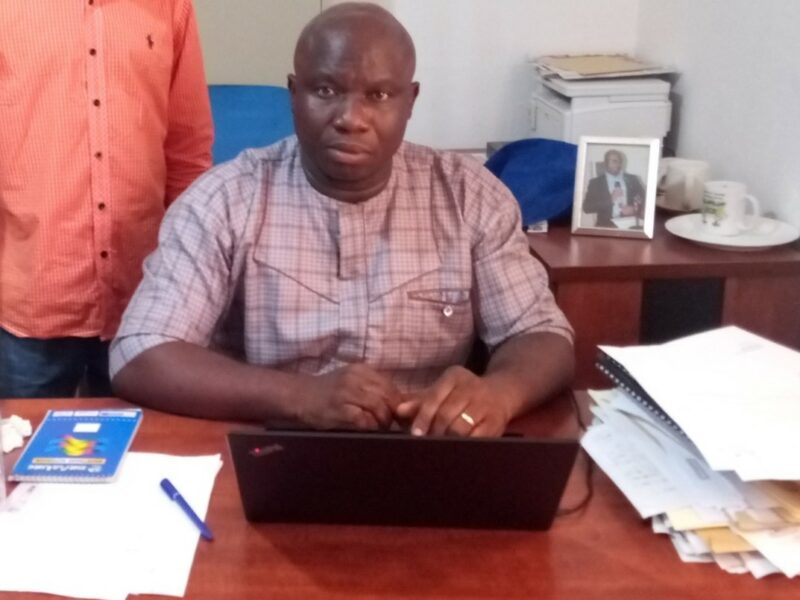Sierra Leone could be in blatant breach of international laws!
The recent rancorous confrontation between South African miners and the reckless Police Officers in the American Platinum Mining Complex in Rustenburg Marikan mine sent shock waves and disseminated animosity among locals as well as condemnation across the international community when the Platinum industrial dispute was viciously settled by the use of arms and ammunitions against miners who legitimately demanded for better work conditions. Some of the mine workers were shot dead in broad daylight just to exercise their basic employment rights. The cruel and pernicious act was a clear contravention of international labour laws and the Universal Declaration of Human Rights enshrined in South Africa Laws. (Photo: Alhaji Thonkla Bangura, author)
Given the appalling method applied to settle industrial dispute in South Africa by all means undermined Africa’s thirst to promote the image of good governance. The outrageous incident also highlighted the profound need to implement a better legal framework to manage industrial relations in Africa, with particular reference to Sierra Leone which is currently attracting a colossal influx of foreign direct investment with no labour laws and effective legal institutions to manage potential inhumane treatments and dispute in the workplaces.
According to a 2010 joint report between the Government of Sierra Leone (GoSL) and the International Labour Organisation (ILO) inter alia stated that “Sierra Leone does not have one and up to date labour law”. This is intriguing; an emerging country with no labour laws keen to enter into the oil and gas industry has to some extent coherently exposed its labour force to potential abuse that could spark resentment and weaken the management of industrial relations.
Further, the report also asserted that “Occupational Safety and Health (OSH) is in a dire situation in Sierra Leone; workplaces are hazardous, the MoELSS OSH unit is non-functional and has no information, and generally throughout Sierra Leone, there is little evidence on the ground of the existence of, or compliance with a preventive safety and health culture. There are deplorable working conditions and health hazardous conditions of work in the mines, and this has become a challenge in a major sector of the country’s economy”.
Therefore, this report should be the locus standi to kick start the culture of effective management of industrial relations which is pivotal in the hunt to attract foreign investment and upholding our international obligations to protect fundamental human rights and maintain the rule of law. Our model to address industrial relations in Africa should not be with the use of cannons, AK 47’s, nor batons, we should be seen confronting the challenges of industrial relations by balancing the need of economic development on the one hand, and protecting the rights of our citizens which is a constitutional and moral duty on the other.
Examining the level of industrial relations in developing economics on face value, we are miles away drawing a correlation between our European and American counterparts in managing industrial disputes. The basic prerequisite that host countries must implement to benefit from FDI’s investment is by having effective labour policies that will facilitate, ethical behaviour, technology transfer, technical and frontline training for employees of host countries which is key to the enhancement of sustainable development and organisational behaviour echoed by ILO Conventions. Encouraging mandatory principles as terms of any contractual agreement to train our unskilled labour is also integral part of maintaining effective industrial relations, enlightenment and active corporate governance particularly as Sierra Leone is suffering from massive brain drain due to decade vicious civil war and the perpetual neglect of our already ramshackle and substandard academic landscape.
Our country, prima facie is in dying need of domestic skilled labour to feed the surge in demand for skilled workers and the quest to meet our yearning economic development. Sierra Leone academic system under no false illusion requires urgent attention and comprehensive tangible reforms to compete with our counterparts in the continent and mirror the demand for skilled labour from foreign companies otherwise we are in a position to certainly lose out to foreign experts with immense skills to offer. Our development can never be sustainable if the fibre of our academic system is collapsing or falling apart hence made us academically impotent and less able to train the next generation skilled labour.
The 2010 ILO joint report further asserted that, “Only 20% of 15-35 years old have completed primary school and there is also a dissonance between the skills in demand in the changing labour market and those produced by the existing training institutions”. In addition, “more than half of the country’s female workers are concentrated in the informal economy and are not recognised, registered, regulated or protected under labour legislature and social protection and are therefore not able to enjoy, exercise or defend their fundamental rights”.
These findings are utterly dreadful and the quantified figures should be a wakeup call for those in positions of authority to act by prioritising education and the role of women in society as key players to meaningful sustainable economic development. Women and children that are offering their time for domestic work across the country with little remunerations in return of their inordinate effort faces in isolation inhumane treatments and abuse with total impunity as there are no domestic laws to hold culprits to account and deter potential abuse of women and children from slave labour and inhumane treatments. Women in our country have seen the extreme ugly side of domestic violence, civil war, as well as unfair treatment in the workplace. The culture of unfair male dominance that has clustered or over-shadowed our political, social and economic spectrum has to change if we are serious about closing the gap of gender inequality and attain meaningful development.
Notwithstanding, Sierra Leone is a tolerant country and has a lot to offer, royalties given to governments by FDI’s must not be the only benefit gained from the exploitation of our national chattels. We must seriously capitalise on the contemporary opportunity of foreign investment to train and develop our labour market that has to be a key condition to any contractual agreement. Efficient labour laws and employment policies will not only underpin the protection of basic human rights of workers in both public and private sectors but will also strengthen the desire of companies and organisations to implement effective internal policies to manage its human resources.
We have seen countries with labour laws struggling to protect the rights of its citizens. Sierra Leone is a signatory to generic international conventions especially the United Nations Universal Declaration of Human Rights and International Labour Organisation Conventions.
Therefore not having an up to date labour laws to protect the basic rights of our citizens is simply unacceptable in this 21st century era and a serious infringement of international laws and a sheer failure of constitutional duty by all parliamentarians. The failure to honour a simple constitutional duty to create labour laws, according to ILO report has left Sierra Leoneans with deficiency of awareness about their human and employment rights and standard throughout the society, including Legislative level.
Meanwhile, the current framework for our country’s labour market ‘SIERRA LEONE DECENT WORK COUNTRY PROGRAMME’ can never be effective or fit for purpose without the implementation of adequate labour laws and enforcement policies. The contemporary framework has to be underpinned by legislature otherwise it is tantamount to a sleeping framework or a lame duck which gives potential green light to employers especially FDI’s to pay less attention to DWCP. We have to be pro-active; we should not wait for disaster like the recent Dhaka factory catastrophe to happen before action is taken. If Sierra Leone is serious about sustainable development, the rule of law and ethical behaviour has to consistently prevail.
We should on the one hand encourage companies to invest in our country and on the other inspire them to abide to our terms and conditions which is a normal business ethics across developing and developed economics. Our labour market should not be entirely left unregulated, it could lead to numerous, industrial faze and terrible exploitation of our young labour force which according to ILO report represents a huge chunk of the country’s future labour market. The UK labour market is also liberal but effectively regulated which gives me the legal prerogative to seek judicial remedy if my employers upset the rights of my employment, it should not be different in Sierra Leone.
Finally, even though the current administration has made reasonable gains in terms of governance and development etc., we should not be complacent in our quest to attain economic development hence reject the concept to disregard our legal obligations to uphold international covenants that we have either rectified or are signatory to. The Decent Work Country Programme (DWCP) prima facie can never be decent if it is not supported by an act of parliament that’s my take on the utter failure to have an up to date labour law in Sierra Leone.
By columnist: Alhaji Thonkla Bangura
Stay with Sierra Express Media, for your trusted place in news!
© 2013, https:. All rights reserved.






